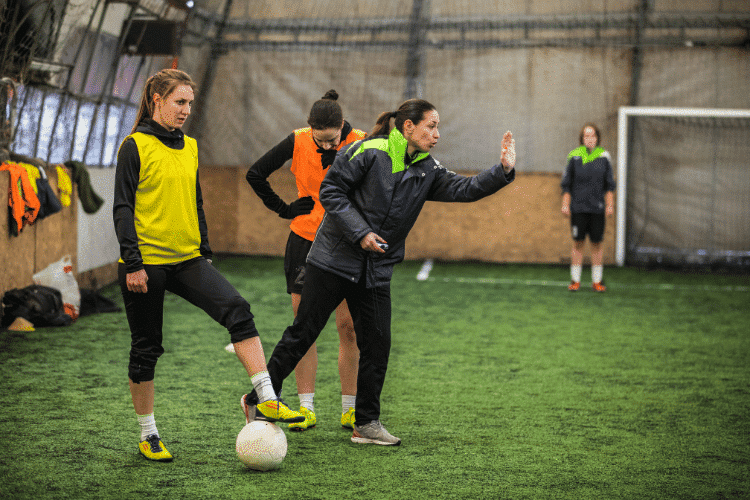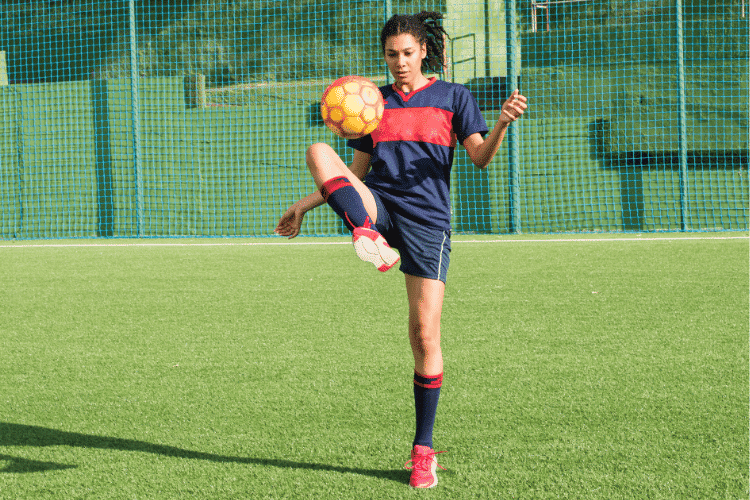In soccer, players get an assist when they pass the ball to a teammate who scores a goal. The rules for awarding soccer assists are relatively straightforward, but some nuances can be confusing.
That’s why we’re here! In this article, we will discuss what counts as an assist in soccer.
We’ll also look at the history of assists in soccer, understand how to get more assists, and answer a few more related questions.
Let’s kick off!
Table of Contents
- 1 What Are the Rules for Counting an Assist?
- 2 History of Counting Assists in a Game of Soccer
- 3 How to Get More Assists in Soccer?
- 4 Can a Player Assist Themselves in Soccer?
- 5 Does Winning a Penalty Translate to an Assist?
- 6 What Is Considered a Secondary Assist?
- 7 The Final Score.
- 8 This article was written by
What Are the Rules for Counting an Assist?
To count as an assist, the following criteria must apply to the pass all at the same time:
- Your pass must be purposeful, with an intended target to eventually score a goal.
- You should pass the ball to a teammate in a scoring position.
- The pass must be the last one before the player scores a goal.
If the pass doesn’t meet these requirements, it won’t be an assist. For example, an opponent or goalkeeper deflecting the pass won’t count as an assist.
There are also some nuances to the rules for awarding assists.
For instance, if a soccer player makes a pass that leads to a goal, but the goal is then disallowed for offside, it won’t count as an assist.
The rules for awarding assists can be confusing, but they’re generally fair.
After all, the goal is to reward players who make creative and decisive passes that lead to goals.
History of Counting Assists in a Game of Soccer
Experts speculate that coaches and soccer fans recognized assists before the 1970s. Yet, no one thought of tracking or recording them as soccer game statistics. Duh!
Players known for their passing ability, such as Johan Cruyff and Diego Maradona, received acclaim for their assists, even when no one officially recorded them.
In the 1970s, the English Football League began to track assists officially. This was a way to provide a more accurate measure of a player’s creativity and vision.
The other major European leagues soon followed suit. By the 1980s, assists were being tracked officially in most major leagues around the world.
There are a few different ways that various leagues track assists. In some leagues, the referee awards an assist to the player who makes the last pass before the scorer lands a goal.
In other leagues, the assist is given to the player who creates scoring chances, even if they don’t make the final pass.
How to Get More Assists in Soccer?
There are a few things that players can do to get more assists in soccer.
First, they need to be aware of their teammates’ positions and make creative passes that surprise their opponents and ultimately lead to scoring opportunities.
Second, they should learn to be patient and wait for the right moment to make a pass. Finally, they must be willing to take risks and try new things!

Here are some additional tips:
- Watch the best passers in the world and learn from them: Pay attention to how the likes of Lionel Messi and Cristiano Ronaldo see the field and how they make their passes.
- Practice your passing skills: The more you practice, the better your passing will become.
- Be confident in your passing ability: If you believe in yourself, you’ll be more likely to make the right pass.
Can a Player Assist Themselves in Soccer?
No, a player cannot assist themselves in soccer. This rule is part and parcel of the sport’s fundamental principles.
In simpler terms, a player cannot pass the ball to themselves to score a goal.
Soccer is a team sport and relies heavily on teamwork and coordination amongst players to successfully score.
Does Winning a Penalty Translate to an Assist?
In most cases, winning a penalty doesn’t count as an assist in soccer.
The first reason is that it isn’t technically a pass. A penalty is awarded when a player commits a foul in the penalty area. The player who wins the penalty doesn’t pass the ball to their teammate.
They simply draw the foul, and then their teammate takes the penalty kick.
Second, it isn’t the last pass before scoring the goal. The penalty kick happens after the referee blows the whistle to award the penalty. This means that the pass that leads to the penalty is not the last pass before the goal.
Third, it would be unfair to other players. If winning a penalty counted as an assist, then players would be incentivized to foul their opponent players in the penalty area.
This would make the game less enjoyable!
Still, there are some soccer leagues that count winning a penalty as an assist, such as the Premier League.

What Is Considered a Secondary Assist?
The secondary assist is usually awarded to the player who makes the pass that creates the scoring opportunity.
For example, say that Player A passes the ball to Player B, who then passes it to Player C, who scores the goal. In this case, Player A would be credited with a secondary assist.
Soccer associations don’t officially track secondary assists like they do regular assists, but they’re becoming increasingly popular in fan discussions. People use them to measure a player’s gameplay on the soccer field.
Ultimately, coaches and scouts see them as a way to detect future soccer stars and creative players!
The Final Score.
An assist is a statistic awarded to a player who makes the last pass before a teammate scores a goal in soccer.
The pass must be intentional, and it has to create a goal-scoring opportunity for the teammate.
An assist is a valuable statistic because it measures a player’s creativity. It can also point to a player’s ability to communicate with teammates.
If you want to improve your assist numbers, keep the tips we shared in mind!





